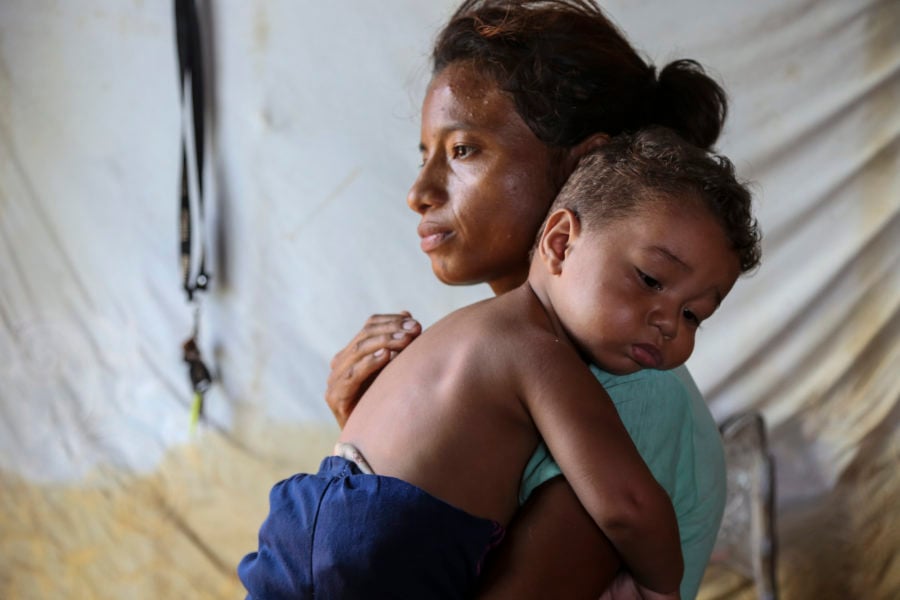While the political crisis in Venezuela is reaching a boiling point, the humanitarian crisis continues to increase as well. More than 3 million Venezuelans have fled their country. As foreign aid is still blocked at the border, Cordaid responds by providing support through Caritas Colombia.

Paul Borsboom, emergency aid coordinator at Cordaid, is currently organizing additional emergency aid with Caritas Venezuela colleagues. Pregnant women, children, elderly and disabled people are Cordaid’s first concern. “Fortunately, we are a member of the worldwide Caritas family. This offers us the only possibility to do something from the Netherlands “, Borsboom says.
Food aid
More than 1000 Caritas neighbourhood kitchens, distributed over Venezuela, are currently operating at full capacity, partly with support from Cordaid. “Food aid and nutritional support for malnourished children is badly needed,” Borsboom continues. “The richer middle class has long left Venezuela. Those who are still in the country are barely able to feed their children. The minimum monthly wage is less than 2 dollars. Families sell everything they have in order to buy food. Many of them have nothing left.”
Medicines for chronically ill
Many government services, like health care, are no longer functional. Borsboom: “Cancer patients and other chronically ill people are desperately looking for medicines. Caritas succeeds in getting essential medicines into the country and in distributing them among chronic patients through its own networks. Cordaid is supporting these humanitarian health care efforts.”
“More than 1.5 million Venezuelans entered Colombia so far. Reception capacities are sorely overstretched.”
Thousands of Venezuelans cross the border every day, after walking for days, sometimes weeks, in harrowing and exhausting conditions. Among the newly arrived are many pregnant women, children and single mothers. People like Eleanny Acosta and Neyger, her son of 1.5 (see photo). Neyger was malnourished on arrival in Colombia. After nutritional support from Caritas he gained strength and weight.
Colombia alone has about 5000 newcomers per day. Borsboom: “At the border, the situation of refugee families is deteriorating by the week. The poorest people are the last to leave. This means that in the coming weeks the humanitarian situation is only going to increase.”
Refugee crisis in Colombia
The unprecedented exodus of Venezuelans has created a regional crisis, most notably in Colombia. Borsboom: “For years now, Colombia has one of the biggest IDP crises in the world. It counts more than 5 million Colombian displaced persons, people driven out of their homes and villages due to conflict and natural disasters. Yet, like other countries in the region, it has opened its arms to Venezuelan refugees. More than 1.5 million Venezuelans entered the country so far. Reception capacities are sorely overstretched.”
“Families arrive after traumatizing journeys, a lot of the children are malnourished and a lot of the women experienced sexual abuse.”
For this reason, five Dutch organizations joint forces to address urgent needs in Colombia. Thanks to a contribution of € 4 million from the Dutch Ministry of Foreign Affairs, Cordaid, Plan International, Save the Children, SOS Kinderdorpen en Terre des Hommes will provide additional emergency aid to Venezuelan refugees and migrants in Colombia.
Borsboom: “Together we can work on different fronts simultaneously. There’s the first response at border sites, with food aid, trauma care and psychosocial assistance. Families arrive after traumatizing journeys, a lot of the children are malnourished and a lot of the women experienced sexual abuse. There is also a need for legal assistance; helping people to get registered, to be informed of their rights. Safe transport needs to be organized, especially now that we see that discrimination and xenophobia are on the rise. Emergency shelters need to be constructed, essential non-food items like blankets need to be distributed. DRA members have the knowledge and the networks to address these needs quickly and efficiently. We hope to be on the ground soon in Colombia. Fortunately, foreign aid is not being blocked in that country.”
Background to the crisis in Venezuela
The Venezuelan exodus is unprecedented for a country in peacetime. Borsboom gives some background as to how this crisis could reach this point. “Venezuela is one of the largest oil-producing countries in the world. Every aspect of its economy is based on oil revenues. All imported goods and services are paid with oil money. A lot of the foreign support – particularly from communist countries like China because Venezuela has been pursuing a socialist policy for years – was based on the trade in futures, promises to supply oil. When the oil price plummeted more than ten years ago, not only did the economy collapse, but also the public and social services that were all financed with oil revenues. Al lot of the oil reserves being already sold in futures, the country lost control over large parts of its biggest source of income.”
“After Maduro took over the baton from President Chavez, in full crisis, mismanagement increased. Other dominoes started falling: employment plummeted, salaries became a fraction of what they were, inflation rose, the ATMs went empty. Even the gas stations are empty in Venezuala. Everything collapsed. The consequence of that was a humanitarian crisis and a refugee crisis. To give you an idea of the extent of the humanitarian crisis: research by Caritas indicates that approximately 70% of children in Venezuela show signs of malnutrition and that 8% are severely malnourished.”
Read more about Cordaid’s emergency responses on our Humanitarian Aid web page.